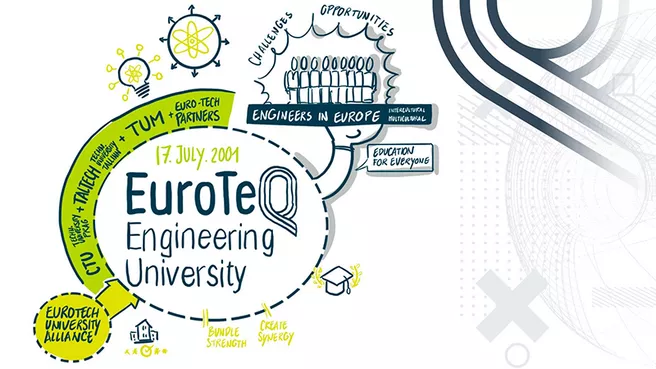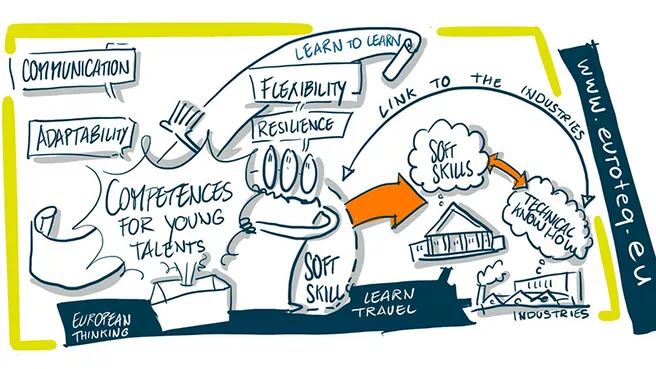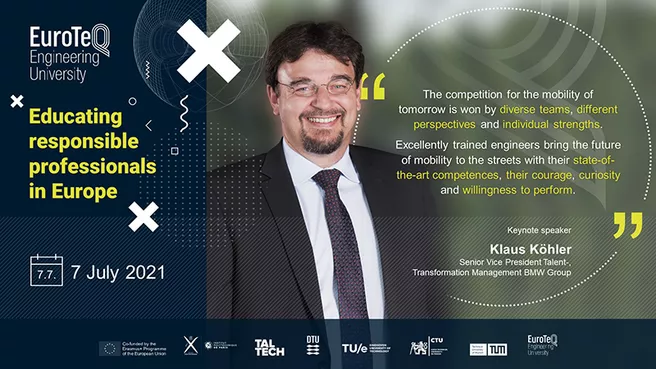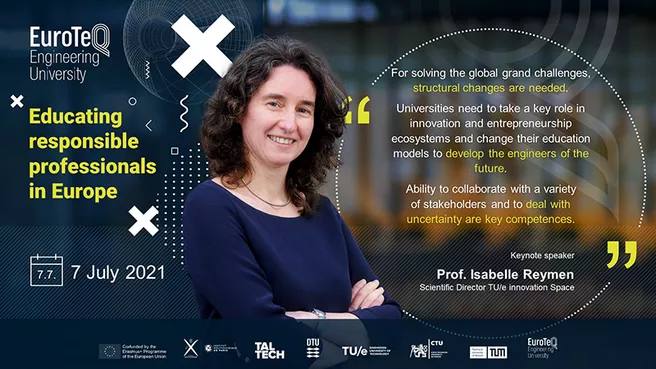The entire EuroTeQ project is built on the idea to bring multiple perspectives together and co-create, which is how innovation is best supported. The EuroTeQ Engineering University wants to establish a systematic approach bringing together different stakeholders from university, industry and society and creating win-win situations to all sides.
This co-creative approach was brought on stage in the high-level event Educating responsible professionals in Europe. Over 160 people from all over Europe followed the live stream. The event started with a welcome address by Professor Gerhard Müller, Senior Vice President for Student and Academic Affairs at TUM.
He recalled the EuroTeQ vision to educate and train the next generation of Europe’s engineers so that they know how to solve problems, work responsibly in teams, can communicate and are able to interact with industry and society across disciplines, cultures and educational levels. “To implement this vision, we will re-engineer learning and teaching at our universities and as such develop the engineering profession in a European context,” he stated enthusiastically.
Industry and universities as platforms for lifelong learning
The discussion was introduced with two powerful keynote addresses. Professor Isabelle Reymen, Scientific Director of TU/e innovation Space spoke passionately about the need for structural changes, to solve the great global challenges. “Universities need to take a key role in innovation and entrepreneurship ecosystems and change their education models to develop the engineers of the future. Their ability to collaborate with a variety of stakeholders and to deal with uncertainty are key competences we need to teach them,” she explained and named successful experiences with challenge-based learning from Eindhoven University of Technology.
The second Keynote was speaker Klaus Köhler, Senior Vice President Talent-, Transformation Management BMW Group. He highlighted the perspective of a global industry player, dedicated to technological innovation, especially in mobility solutions for our future. For him, excellent sound technical education of students is and remains the most important responsibility for universities.
Beyond that, it is also indispensable to focus more on overarching competencies and soft skills. The importance of co-creation is also stressed, as the BMW Group is an active associated partner in the EuroTeQ Local Advisory Board at TUM. “The competition for the mobility of tomorrow is won by diverse teams, different perspectives and individual strengths. Excellently trained engineers bring the future of mobility to the streets with their state-of-the-art competences, their courage, curiosity and willingness to perform,” said Köhler.
From the keynotes, it became apparent that industry and universities must be active in joint educational formats and create life-long learning opportunities together. Students need to be equipped to be self-directed learners and quickly adapt to new technological developments and unforeseen events in their future careers. At the same time, it is a recommendable strategy for industry to make sure that further professional and personal development will be fostered.
Real-world challenges as success factors in teaching
Nicolas Termote, a Microengineering student at École Polytechnique Fédérale de Lausanne, participated in the panel discussion as a representative of the EuroTeQ student council. Also on the panel were Sofie Berglykke Aagaard & Kathrine Jerl Jensen, two young founders of Incept Sustainability, a Danish e-learning and analytics startup. Both women are former students of Denmark’s Technical University DTU. Bringing in the younger perspectives on stage immediately led to a vibrant and sometimes controversial discussion.
The audience was able to see that the young generation of learners have a strong willingness to change the world and make it a better place. They also reacted positively to the idea that universities need to adapt their curricula and focus more on teaching competences that apply to manifold situations they may face in the future. “An engineer needs to be versatile,” said Nicolas Termote and expects universities to prepare him in fields of technical skill as well as overarching, future-proof competencies. The EuroTeQ Engineering University aims to develop shorter and diversified learning formats, award them with micro-credentials, and allow for individualised learning paths.
The audience learned that when real challenges from the non-academic world are incorporated into teaching, students are highly motivated and acquire deeper competences. Courses that take the challenge-based learning approach are often very popular and get good evaluations. Also, professionals are eager to learn if this is incentivized by the employer. But skills alone are not key. They have to be accompanied by a responsible mind-set that helps to shape innovation for the benefit of society. The EuroTeQ project aims to embed all teaching and learning in European values, as a vehicle against technophobia and for societal cohesion.
Taking cooperation one step further: co-creation
All speakers ended with a personal recommendation to the ambitious European project, which echo the different perspectives of the discussion. “Co-creation needs to be more than a buzzword, but aim at real collaboration and a strong openness to different perspectives, viewpoints and approaches. It is a tool as well as a mind-set,” said Sofie Berglykke Aagaard and Kathrine Jerl Jensen. They both also appreciated that young learners and professionals have found a prominent voice on the panel.
After launching the collaborative EuroTeQ project in November 2020, this was the first outreach event the partners organized for the broader public. The over 160 viewers from inside and outside the universities engaged in interactive polls and posed relevant questions to the experts. Rob Verhofstad, Chair of the Executive Board of the HAN University of Applied Sciences, guided through the discussion, which was visualized by graphic recorder Matthias Schwert.
You have the chance to re-watch the most interesting discussion amongst our keynote speakers and panellists, read the key takeaways, and take a look at our graphic recording on the new EuroTeQ website.
If you are interested in co-creating with us and becoming part of the dynamic EuroTeQ activities, please contact Maria-Valerie Schegk.



